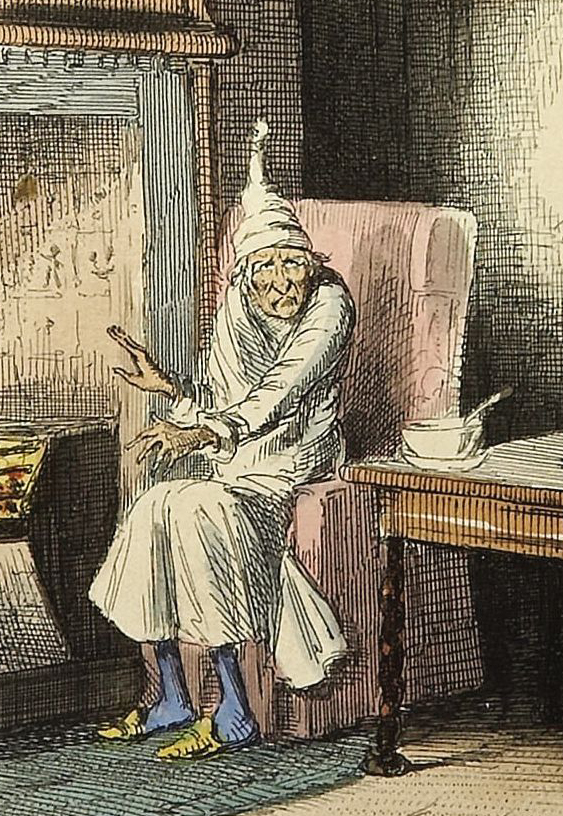
Scrouge engaging in an act of benevolent charity
A fairly common popular sentiment which flutters around as a pesky meme every once and a while is the idea that unilateral frugality is some how economically shameful and deleterious. Economists nowadays do indeed understand the dangers of the Paradox of Thrift, but to people with amateur upbringings in economic intuitions, it's somewhat how surprising they disdain others' savings. Certainly the reader has heard numerous commentators demanding that the greedy rich spend the "huge piles of cash" they sit on to share their wealth, or equally that foreign workers come to the United States, "steal" our money by working, and send it off to their families abroad. Both sentiments err on basically the same mark: that money is something inherently valuable and to "hoard" it is damaging to others.
However money is not something that has a magical use apart from exchange; so let's compare it to another medium of exchange, say Chuck-E-Cheese tickets:
In the Chuck-E-Cheese market, patrons buy tokens which can be used to play numerous games which supply tickets. In exchange for these tickets, Chuck-E-Cheese offers a variety of nick-nacks, stuffed animals, even over-priced electronics. So costumers supply the services of buying tokens and playing games while the Chuck-E-Cheese establishment supplies prizes. Now if a patron were to walk into Chuck-E-Cheese and supply them with cash to play games and walk straight out with a lump of earned tickets, he is a currency-hoarder just like any frugal person might be. But anyone can clearly see that he has failed to take advantage of his situation; he has given a great deal of services of Chuck-E-Cheese without asking a prize in return; a more emotional person might even say that he has allowed Chuck-E-Cheese to exploit his labor.
Money is, in a sense, an IOU certificate. It is to no one's particular advantage to hoard them, but when people do, it essentially means that they have produced goods or preformed services to earn cash without making anyone pay them back with labor. Savers do indeed intend to redeem their IOUs later, but they supply them a good in themselves as a psychological hedge against risk. People who keep money without the intent to spend are engaged in an act of charity, and the only cost to the recipient is the opportunity cost of using that same money elsewhere. People when making the analyses above, that the rich or foreign labor hoard money to the detriment of others, have forgotten the goal of economic activity is to obtain goods, not money, like the goal of obtaining Chuck-E-Cheese tickets is not the end in itself, but the their redemption for prizes.
In a sense, this is a classical example of money fetishism; people see that money can be exchanged for goods which are actually useful, so they begin placing an all-encompassing value on the currency itself. They seem to believe that holding money is intrinsically beneficial to them even without risk and fail to recognize that if a group of people is hoarding cash, it necessary implies that all other people are receiving an amount of services that they don't need to fully repay with their own services. If there can be any vituperation of exploitation, it must be targeted at the later group, for they are certainly blessed with more than they worked for.
People can see the irrationality in the example of the Chuck-E-Cheese patron because they don't fetishize Chuck-E-Cheese tickets, yet for some reason people have much more trouble realizing the same about the dollars which they know and love. Thus the strange truth is that anyone who suggests that the rich buy more services of the poor is suggesting by definition that the poor should work more for the advantage of the opulent.
Now just as well if cash
earned by a foreign worker or a rich baron is not spent or if it is
thrown to the bottom of a bottom-less pit for that matter, the effective
money supply has fallen. This means that cash is slightly more scarce
and thus, in terms of all other goods, more valuable. So the endless
pocketing of money presumably by the wealthy, or its endless exportation
at the hands of foreign labor results in an increase in purchasing
power for everyone else, because the exchange value of their money has
risen, this all said while they have received more goods. This remains
as an important hedge against inflation.

The arguments made against hoarding demonstrate one of the most commonly made misconceptions about economics, namingly, that money, not production, is the target of economic transaction. The economic activity performed by foreign labor or wealthy financiers results in a more productive society and because these parties do not "redeem their prizes" in the domestic market, others are getting something for less of their own work.
Of course the fact that such feelings would be even voiced is a strange statement about how commercial society has turned our selfishness upside-down; instead of complaining about the tasks we have to do, people line up out of employment offices even for the most menial jobs, people ask to work more and more hours and people beg for opportunities to do work to better others' standards of living. It's a strange day when our society views industriousness, frugality and constant work to the benefits of others as selfish. We have essentially turned into a Gift Economy in which all people in society race to create goods and perform services to others. The only difference is that our cultural IOU happens to be mediated by a piece of paper and not just an aberration of the mind, but then again, there may not be much of a difference after all...